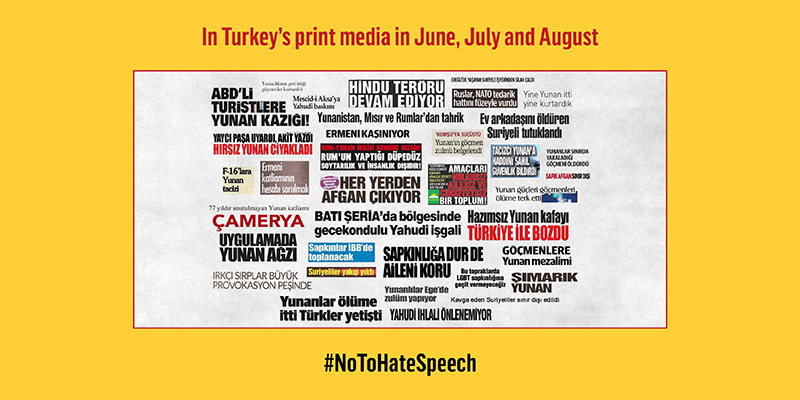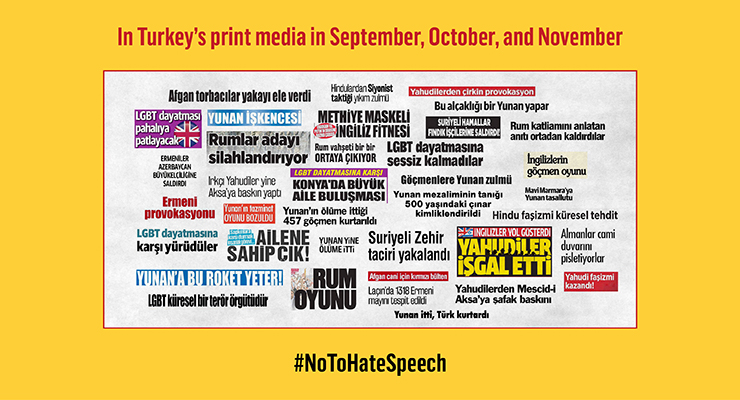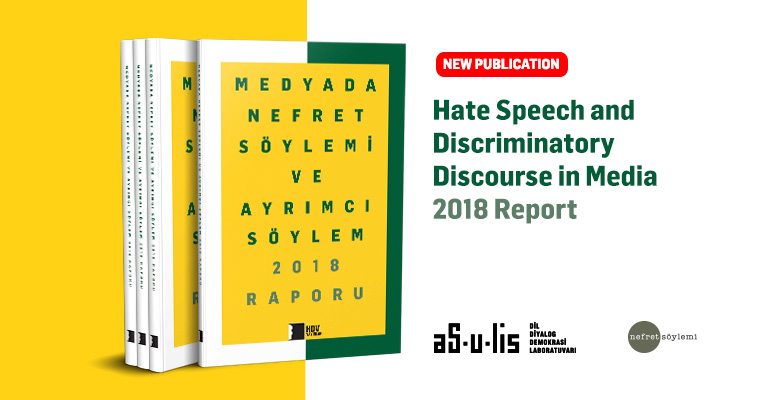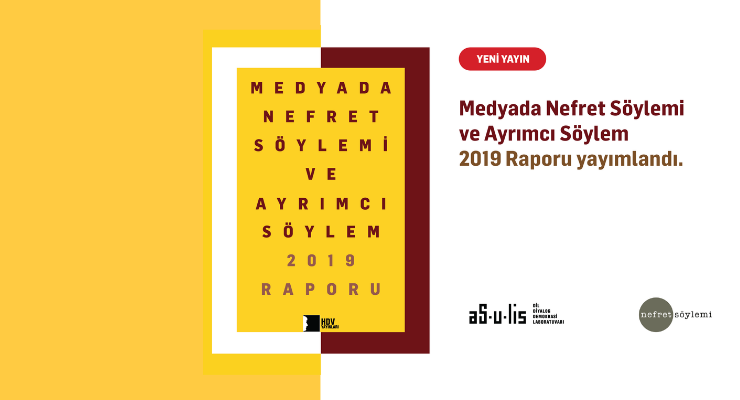Using the method of critical discourse analysis, we evaluated news articles and columns that were printed in June, July, and August 2022 and targeted national, ethnic, and religious identities, LGBTI+ persons, and women. You may access news clippings and detailed analysis at “Media Watch on Hate Speech: Our Selections from June, July and August.”
In the Turkish print media in June, July, and August:
- Greeks were targeted with negative statements such as aggression, threats, and cruelty amid tensions between Turkey and Greece and the policies implemented by Greece toward migrants;
- LGBTI+ persons were portrayed as a threat to society and family values and became the target of hate speech;
- By creating the perception that Syrians and Afghans pose a threat to the social order, refugee identity was criminalized;
- The conflict between Azerbaijan and Armenia was covered by targeting Armenian identity, and negative prejudices in society toward Armenians were reinforced;
- Negative statements of violence and aggression were generalized against the Russian identity over the war between Ukraine and Russia.
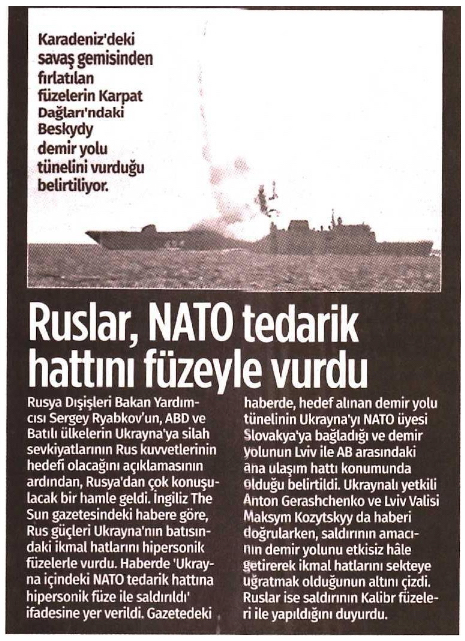
The actions of the Russian military are generalized to Russian identity in the headline of the news story. In both the headline and the body of the story about Russia’s attack on a NATO supply line located inside Ukraine, Russians are associated with wrongdoing and are deemed a threat. In the news, it was noted that Ukrainian state officials confirmed the incident, statements by Russian state officials are discussed with reference to the Russian identity. This reinforces prejudices against Russians and incites hostility.
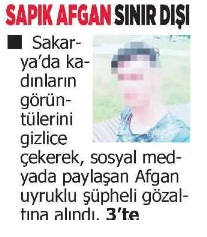
A report about claims that women in the town of Sakarya were secretly filmed links the crime to the Afghan identity, although national identity has no direct relationship with the incident and the main problem of male aggression is ignored. Afghans are associated with violence and aggression and are marked as a threat. This way, prejudices toward Afghans and perceptions that they constitute a threat are reinforced.
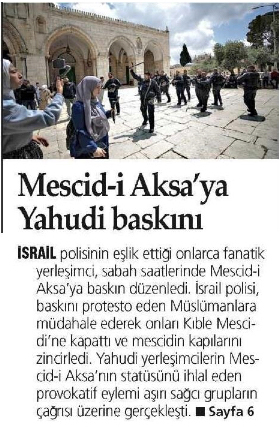
In the story about Muslim groups protesting against Jews who went to Al-Aqsa Mosque in Jerusalem during the Shavuot holiday, the intervention of the Israeli police against the protesters is problematized. Responsibility for the actions of one group is generalized to the entire Jewish identity. In the headline, the Jewish identity is associated with a “raid.” Thus, Jews are marked as a threat, and a perception of a hostile identity is stoked.
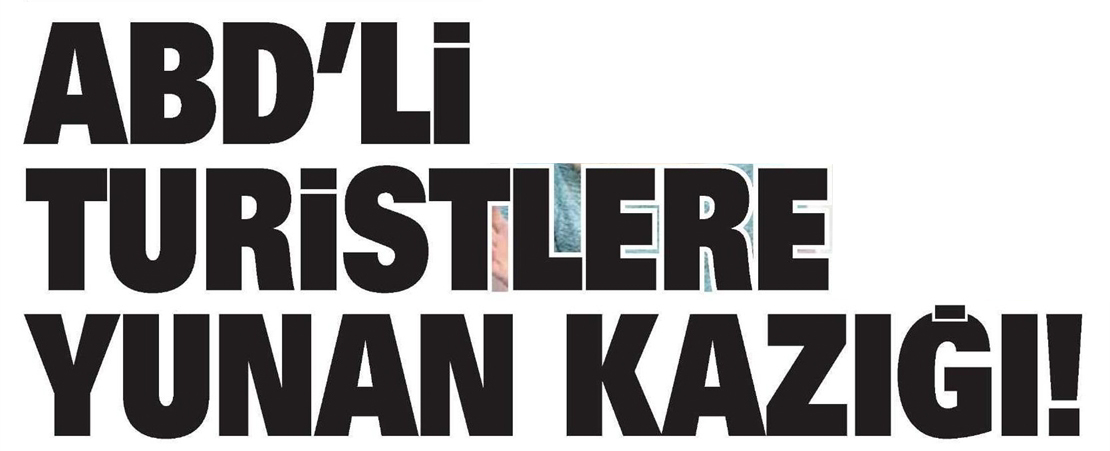
A story about American tourists vacationing in Greece who objected to an exorbitant restaurant bill and were then harassed by the employees covers the incident by targeting Greek identity. It describes the incident with the phrase “Greek rip-off” in the headline to create a negative perception about an identity. The negative term reinforces prejudices about Greeks and fuels hostility.
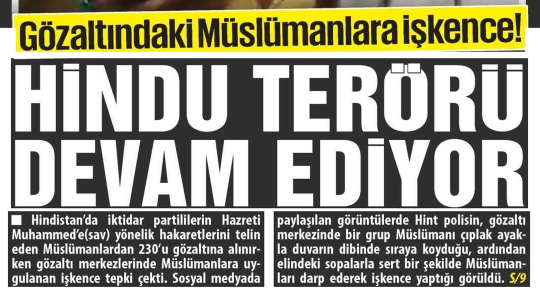
The detention of and police violence against a group of Muslims protesting the ruling party in India are referred to in the headline as “Hindu terrorism.” The action of one group is attributed to the whole identity, associating it with violence and aggression. The responsibility for the actions of state officials is placed on the Hindu identity. Thus, Hindus are deemed a threat, and a perception of hostility towards them is fueled.
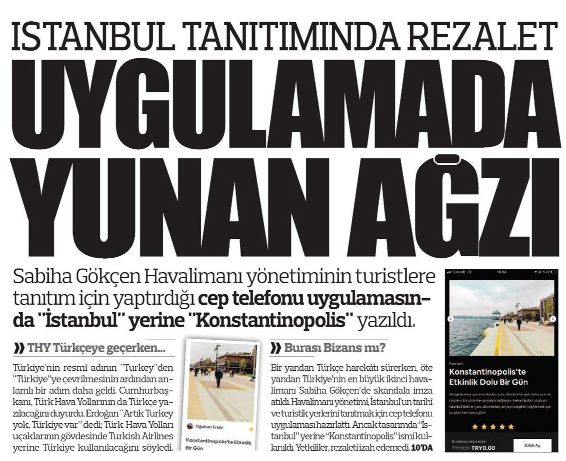
The news that Sabiha Gökçen International Airport prepared a mobile phone application promoting Istanbul cites the choice of the word “Constantinople,” instead of “Istanbul,” as a “disgrace” and “scandal.” The term “Greek viewpoint” in the headline produces hate speech against an identity with symbolization. The negative perception towards Greeks is reinforced, and prejudices are stoked.
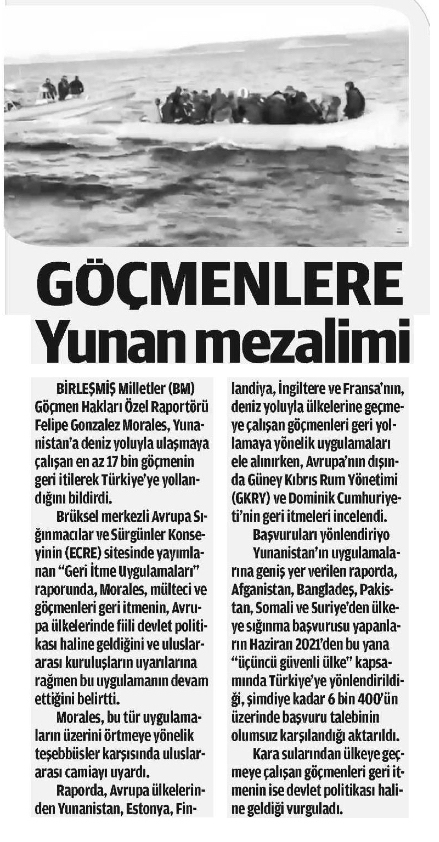
A story on the report titled “ Pushback Practices” published by the European Council on Refugees and Exiles covers the Greek state forces’ prevention of migrants’ passage to Europe by targeting the Greek identity in the headline. The responsibility for human rights violations suffered by refugees due to state policies is placed on the Greek identity. The incident in question is generalized to the Greek identity, associating it with cruelty. By creating a perception of a threat from and hostility toward Greeks, existing prejudices are fed.
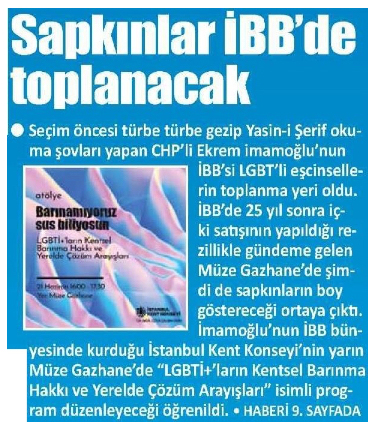
News about an event planned at the Istanbul Metropolitan Municipality’s building during Pride Week labels LGBTI+ individuals with homophobic terms such as “perverts” and generates hate speech by targeting sexual orientation. While the Istanbul administration is criticized for providing workshop spaces for events to be held within the scope of Pride Month and for starting alcohol sales, LGBTI+ persons are targeted. This reinforces hostility by fueling prejudices about identity.
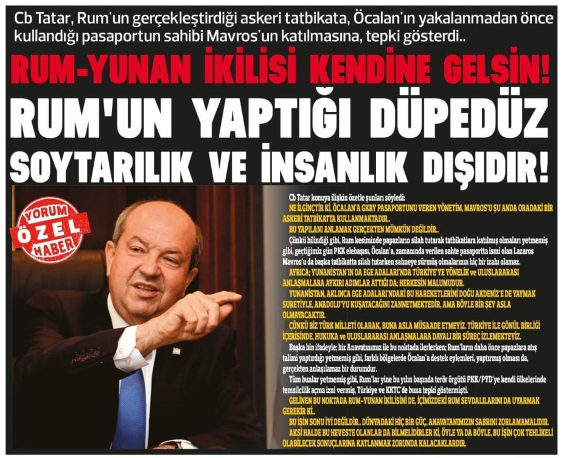
In the headline, the words of the president of Turkish Republic of Northern Cyprus are cited without using quotation marks, linking Greek Cypriot and Greek identities with terrorism, which reproduces hate speech. The news refers to the state policies of Turkey and Greece toward Aegean Sea islands and places the responsibility for these tensions on the Greek identity. This way, prejudices against Greek Cypriots and Greeks are reinforced. Identities are marked as threats and made to seem hostile.
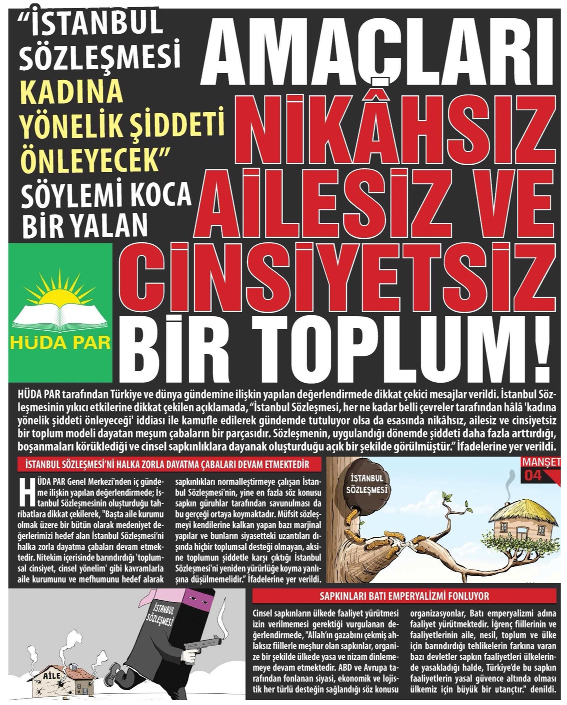
The article conveys a political party’s statements about the Istanbul Convention, an international treaty to prevent domestic violence, after it held a meeting on matters of the day. The article points to the Istanbul Convention, gender equality, and sexual orientation as threats to “family and society.” Sexual orientation is associated with “perversion” and is deemed a threat. This increases existing prejudices and hostility towards LGBTI+ persons.
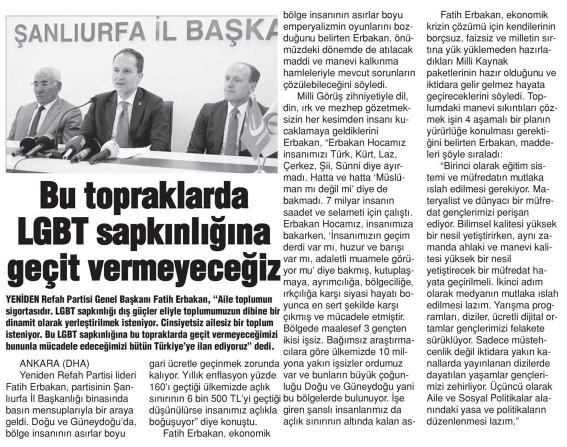
The news which conveys the statements of the chairman of a political party puts the politician’s words without quotation marks in its headline. The headline associates LGBTI+ persons with “perversion.” The news produces a homophobic discourse by targeting gender identity and sexual orientation. The perception that LGBTI+ persons pose a threat to “family and society” is created, and hostility toward the identity is reinforced.
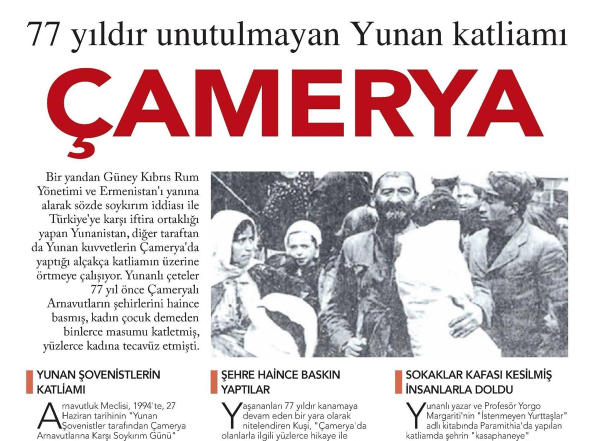
The article about the Albanian parliament’s recognition of the “Day of Greek Chauvinist Genocide Against the Albanians of Chameria” and incidents allegedly carried out by by Greek forces attributes the responsibility for the violence to the Greek identity. It generalizes the event as a “Greek massacre,” including in the headline. Thus, the perception of a threat from the Greek identity is created, and hostility is fueled.
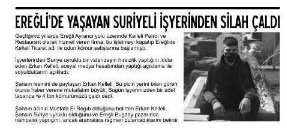
Reporting the claims made on social media by a business owner in the town of Ereğli that a Syrian had committed theft, the news targets the Syrian identity in the headline, which is irrelevant and so creates disinformation. Syrians are marked as a danger and a threat, and existing prejudices against refugees are heightened.
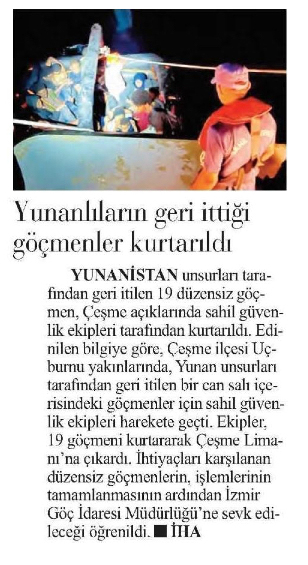
The news about Greek security forces pushing back migrants into Turkish territorial waters near the town of Çeşme generalizes the incident to the Greeks identity in its headline. By associating the Greek identity with cruelty, a perception of hostility about Greeks is created, and existing prejudices are reinforced.
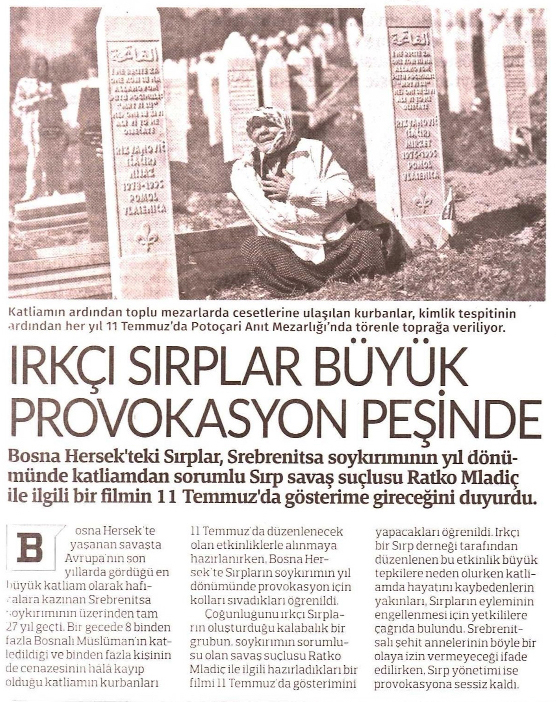
News that a film about the war in Bosnia and Herzegovina will be screened is described as a “provocation.” The acts committed by the Bosnian Serb army in 1995 in Srebrenica are attributed to the Serbian identity, and the headline calls Serbs “racist.” The headline generalizes the Serbian identity as criminal and prejudices against Serbs are reinforced.
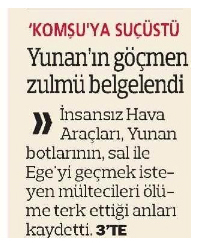
The news’s headline links the Greek identity with “persecution” in a story about the actions of the Greek coastguard against refugees. Greece’s refugee policies are blamed on the whole identity. This creates a perception of the enemy about the Greek identity, and existing prejudices are hardened. Instead of emphasizing the actual problem that refugees’ human rights have been violated, it associates this violation with identity and ignores the real issue.
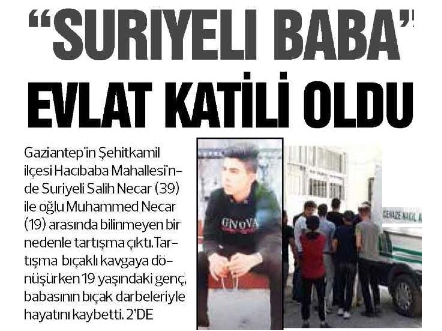
The news about an alleged incident in the city of Gaziantep emphasizes the Syrian identity in the headline and body of the story, although it has nothing to do with the incident. Identity is targeted by placing the responsibility for the alleged incident on identity.
Prejudgments linking negative developments in the economy and society to the presence of Syrians in Turkey and generalizations that this group poses a “threat” to the country are among the most frequently occurring discourses. This results in an increase in prejudices and discrimination against the identity.1
1 Tekin, F., "Discrimination Against Syrian Refugees in Media: Misinformation and Distortion" ,in Hate Speech and Discriminatory Discourse 2017 Report (İstanbul: Hrant Dink Foundation, 2018).
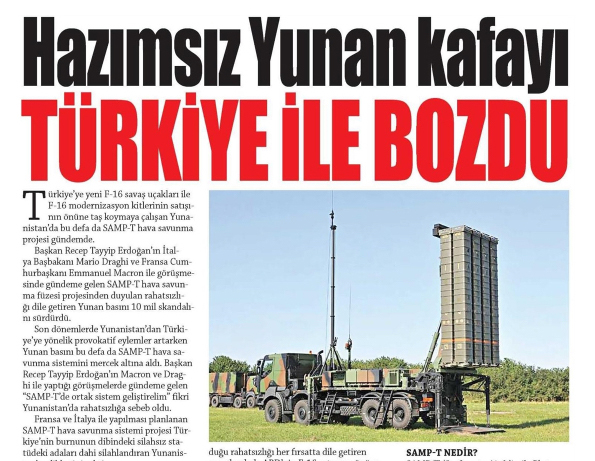
The Greek identity is targeted in the headline of the news about Turkey’s military strategies being covered in the Greek press. With the word “jealous,” a perception is created that there is a conflict and enmity between the two identities. In this example of hate speech, which is produced through the discourse of enmity and war, hostility between the two identities is fueled.
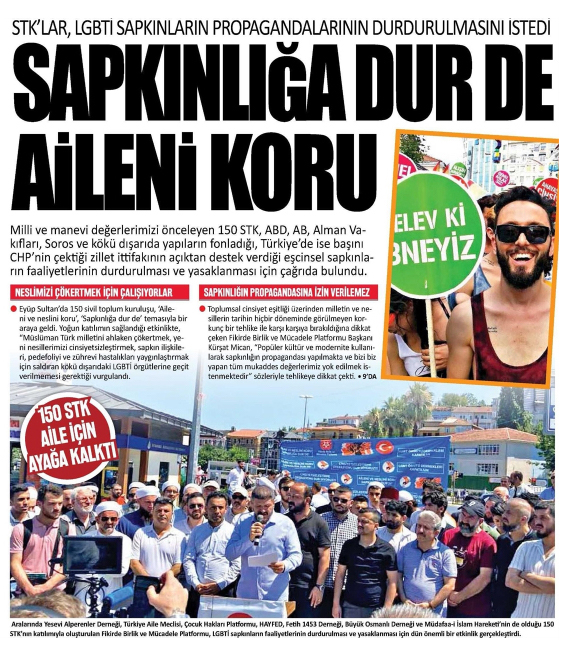
A statement made by NGOs in Istanbul’s Eyup Sultan district is used in the headline to target the LGBTI+ identity. By associating identity with perversity, hate speech based on sexual orientation is produced.
Sexist, misogynistic, homophobic, biphobic and transphobic discourses and practices narrow the living space of women and LGBTI+ persons, prevent them from participating in social life as free and equal individuals, and in many cases result in murders of women and LGBTI+ individuals.2
2 Az, İ., Ensari, P., & Özkan, Ş. “Hate speech in Turkey's print media: The experience of the Hrant Dink Foundation's Media Watch on Hate Speech Project”, in Media and Hate Speech - II, ed. Altuğ Yılmaz (İstanbul: Hrant Dink Foundation Pub., 2021).
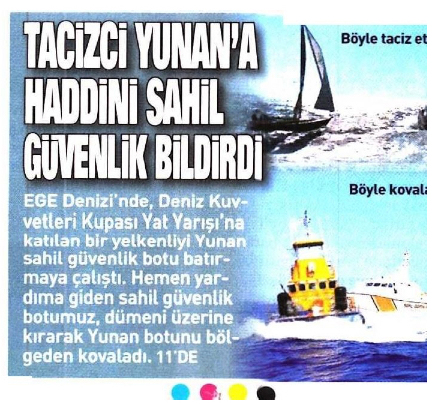
An alleged incident between the Greek coastguard and a boat participating in the Navy Cup Yacht Race in the Aegean Sea is described in the headline with the phrase “harassing Greek.” The alleged incident is attributed to the entire identity, which is accused of “harassment,” making it the target of hostile discourse.
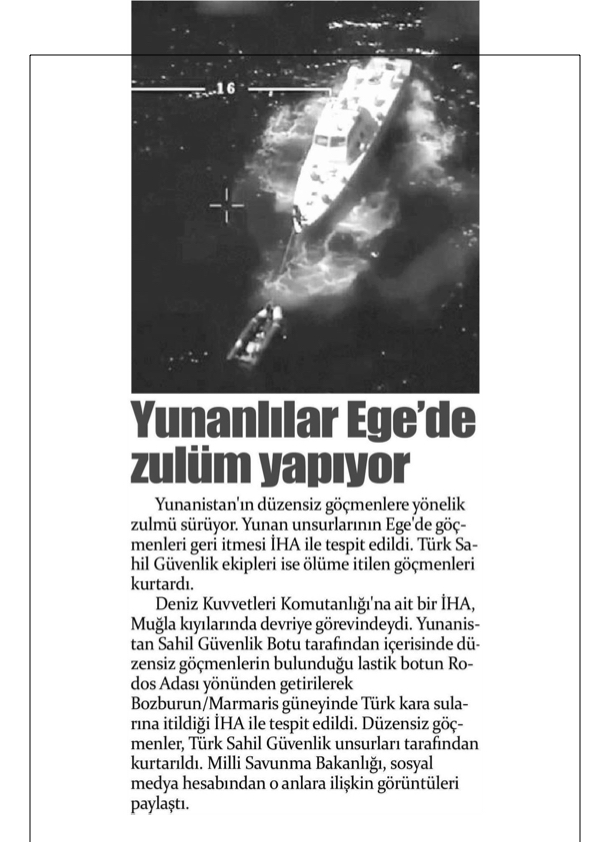
The story about the alleged actions of the Greek coastguard against refugees in the Aegean Sea generalizes the incident to the Greek identity, associating it with cruelty. Turkey’s coastguard is portrayed as saviors in the face of the Greek coastguard. In this way, prejudices are reinforced while hierarchy is established between two identity groups. The perception of Greeks as a threat is strengthened, and a perception of hostility is encouraged.
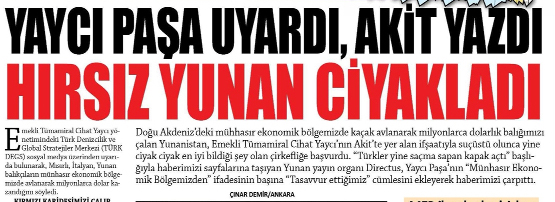
The story problematizes fishing by fleets from Egypt, Italy and Greece in the eastern Mediterranean. It claims that boats from Turkey do not fish in this region and that fishing is prohibited. The Greek identity is targeted with the claim that the other countries fish there and make serious profits. Greek fishing in this region is described as “theft,” associating Greeks with a crime. Prejudices against Greeks are reinforced, and an identity is made the enemy.
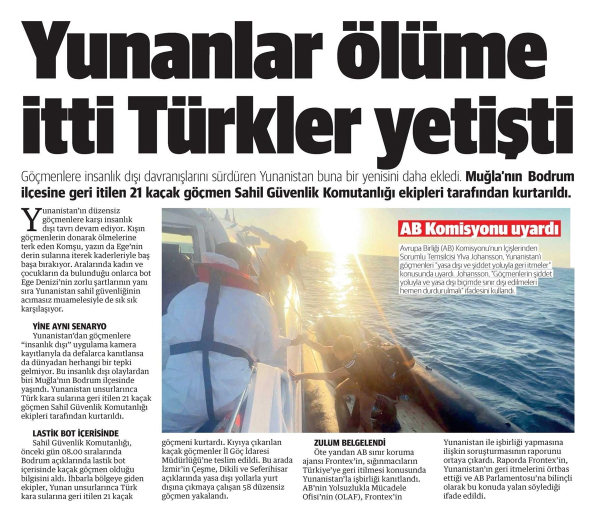
The news about the Greek coastguard pushing back refugees to Turkish territorial waters and Greece’s refugee policies generalizes the incident to an identity. Rights violations perpetrated by the Greek coastguard against refugees are attributed to the Greek identity. A hierarchical relationship is created between Turkish and Greek identities, by portraying Greeks as inferior without humane values. Existing prejudices and the perception of hostility toward Greeks are reinforced.

An alleged incident in the town of Fethiye is covered by linking wrongdoing with the Syrian identity and placing it in the headline. An argument and violence that broke out over the purchase of a telephone in Karaçulha neighborhood are covered by emphasizing that Syrians were involved. Although the incident is not connected to identity, being Syrian is highlighted. By associating the Syrian identity with crime and violence, the current threat perception towards refugees is strengthened.
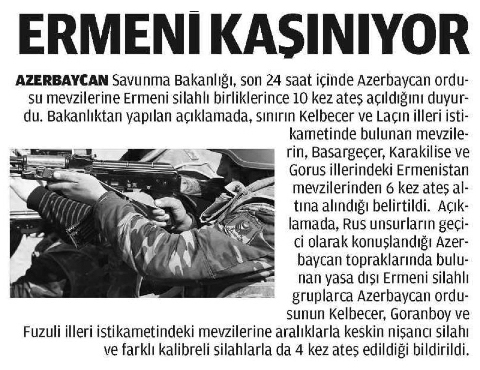
The news covers alleged actions carried out by the Armenian armed forces against Azerbaijani positions, relying on a statement made by the Azerbaijani Defense Ministry. The event in question is conveyed in the title of the news by making a generalization about the Armenian identity. By associating identity with aggression and violence, the perception that Armenians pose a threat is produced, and the perception of hostility towards Armenians is reinforced.
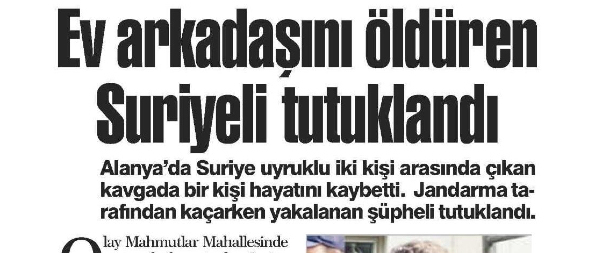
The story about an argument between two people in the town of Alanya that resulted in murder emphasizes the Syrian identity in the headline and body, although the identity is not connected to the crime. The perception that Syrians are prone to crime is reinforced, and their identity is associated with crime. Thus, the perception that refugees pose a threat to society is reinforced. Existing prejudices and hostility are strengthened.
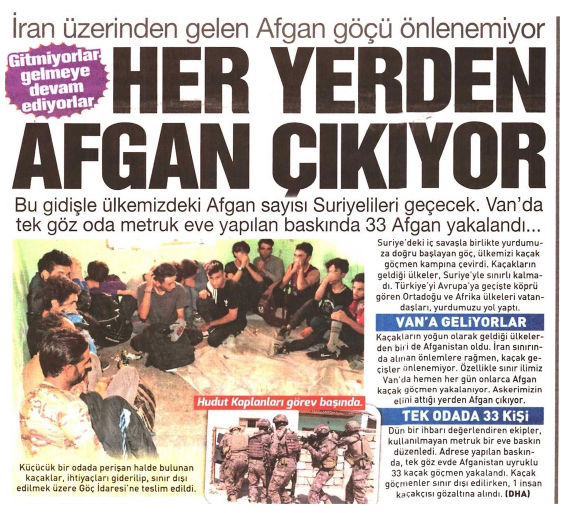
The news about the presence of unregistered migrants in the eastern city of Van marks the Afghan identity as dangerous and dehumanizes it in its headline. By claiming that Afghans use Turkey as a bridge, a perception of a “threat” is created, and negative judgments are reinforced. The story claims the number of Afghans in Turkey will exceed the number of Syrians, producing a discourse that puts refugees’ ability to access their rights at risk.

The news story about an incident at a refugee camp emphasizes the Syrian identity, even though identity is not related to the alleged crime. Similarly, claiming that the same people burned down a house where they stayed in the town of Kahramanmaraş two months ago, the story emphasizes the continuous nature of violent acts. In this way, being Syrian is linked to violence and aggression, and identity is deemed a threat. While existing prejudices against Syrians are compounded, hostility is also being fueled.
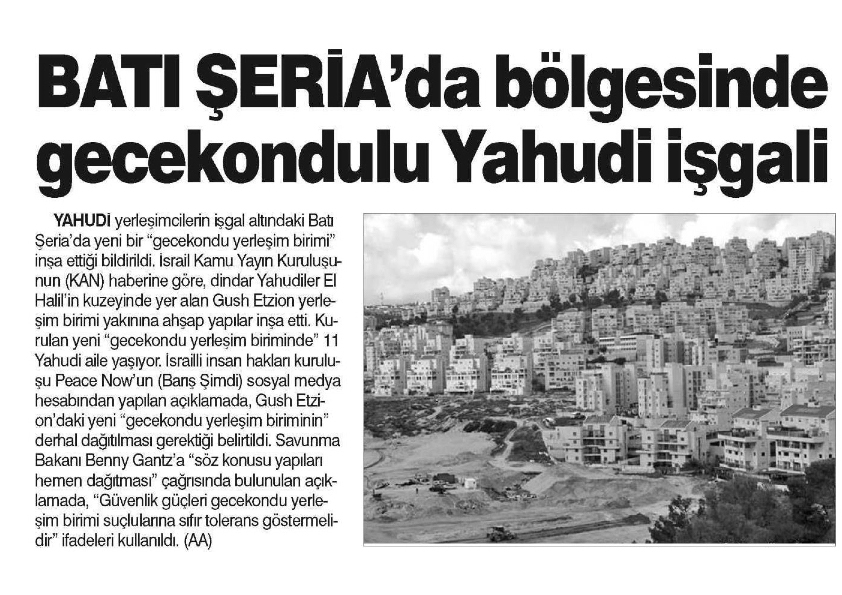
The news claims that a slum settlement is being built in the West Bank and that Jewish families live in the buildings, calling this situation a “Jewish occupation.” The incident in question is attributed to the entire identity, which is deemed a threat. The responsibility for what happened is placed on the Jewish identity, and Jews are targeted by turning them into enemies.
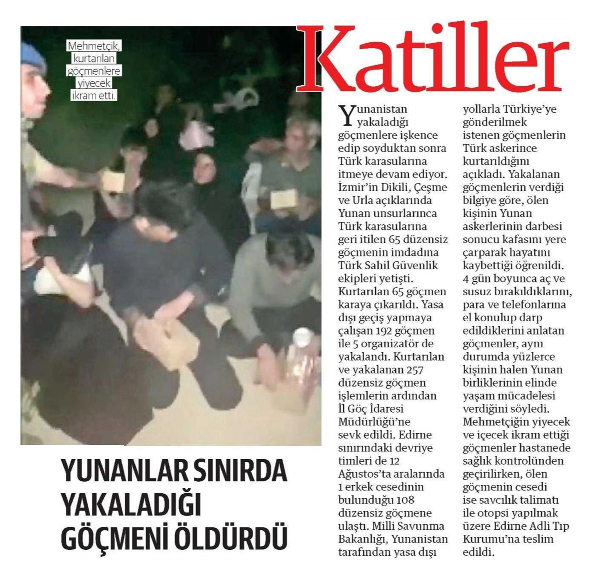
The story, which deals with the pushback interventions and acts of violence by the Greek coastguard against refugees in Turkish territorial waters, targets the Greek identity in its headline. The human rights violations are generalized to the entire Greek identity with the phrase “murderers” in the headline. Greeks are associated with violence and a lack of human values. Existing prejudices against identity are reinforced, and a perception of hostility is fueled.
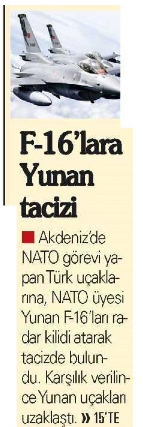
The news about Greek military planes using radar-lock on Turkish warplanes conducting NATO flights in the eastern Mediterranean calls the incident harassment. The Greek identity is shown as responsible for the tensions between the two countries. With the phrase “Greek harassment” in the headline, identity is blamed and Greeks are associated with harassment. In this way, prejudices against Greeks are reinforced.
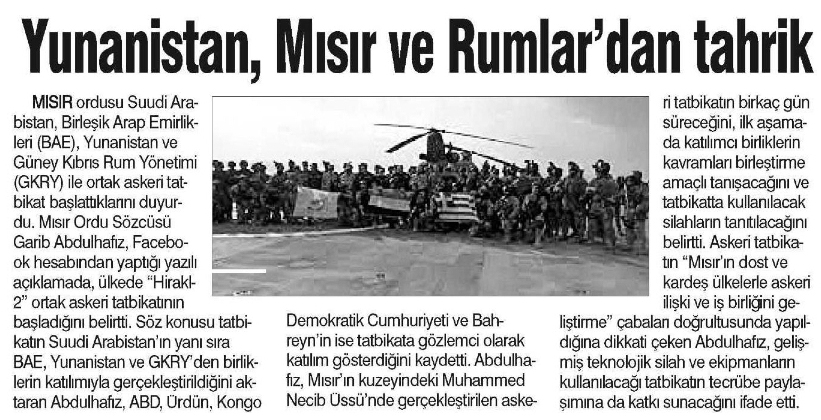
A story about the Egyptian army’s announcement of military exercises with Saudi Arabia, United Arab Emirates, Greece, and Cyprus describes the incident as a provocation. In the headline, the Greek Cypriot identity is associated with violence and aggression. Thus, Greek Cypriots are labeled a threat, and the perception of hostility towards identity is strengthened.
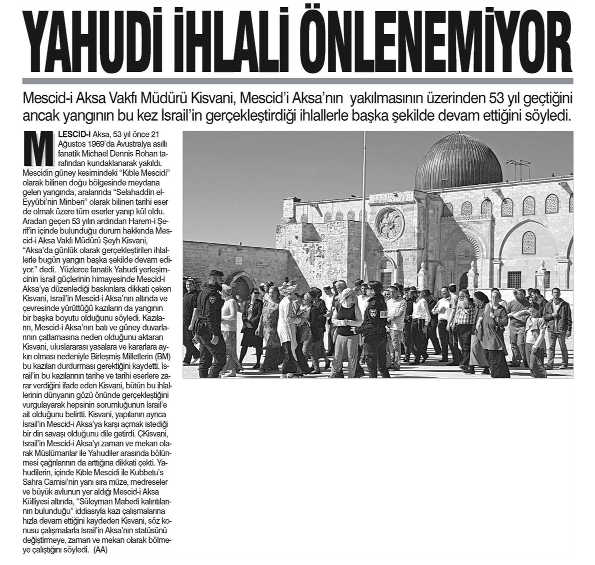
The news about the alleged actions of an extremist group attributes the incident in question to the entire Jewish identity in its headline. The responsibility for an arson attack on Al-Aqsa Mosque is generalized to identity in the headline with the phrase “Jewish aggression.” While the story criticizes Israeli state policies, the responsibility is placed on the Jewish identity and Jews are associated with aggression and deemed a threat, and so the existing perception of hostility towards the identity is reinforced.
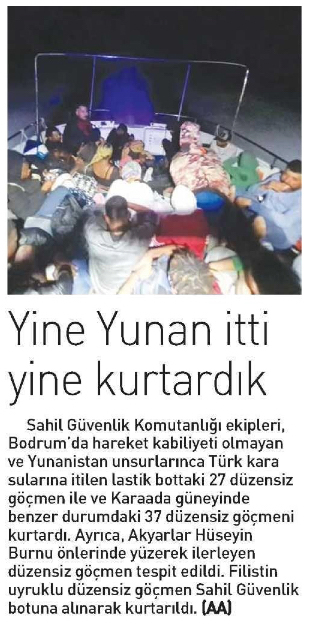
The news about actions the Greek coastguard took against migrants attributes responsibility to the Greek identity. The coastguard’s pushback of refugees into Turkish territorial waters is generalized to the Greek identity in the headline. Greek and Turkish identities are pitted in opposition, and the word “again” suggests the actions are consistent characteristics of each identity. This reinforces prejudices by emphasizing that Greeks persist with negative actions. Hostility toward Greeks and polarization between the two societies are fueled.
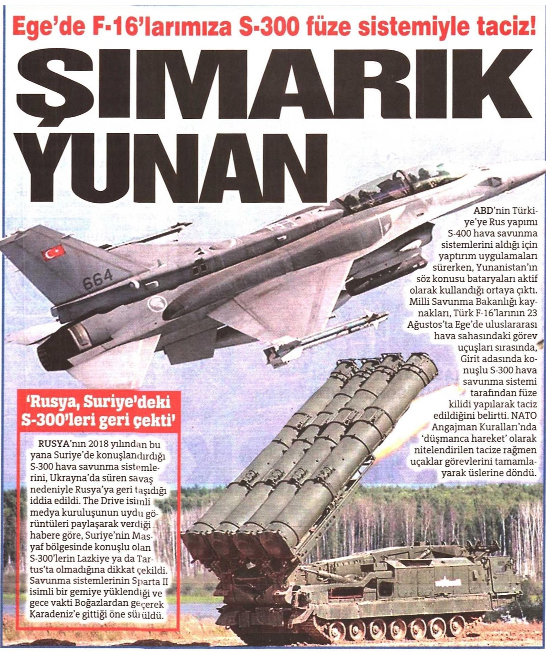
The story, which is about the Greek air force’s response to international mission flights by Turkish F-16s over the Aegean Sea, attributes the incident to the Greek identity by associating the incident in question with being “spoiled” in its headline. By characterizing an identity with a negative adjective, that identity is targeted and hate speech is produced. Existing prejudices against Greeks are fueled, and a perception of hostility is reinforced.
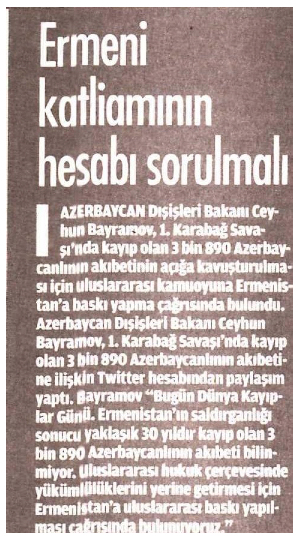
The coverage of a politician’s statements about his views on the Nagorno-Karabakh conflict targets the Armenian identity by associating it with a “massacre” in the headline. The responsibility for incidents that took place between two states is put on the Armenian identity in general, and identity is portrayed as a threat. Armenians are associated with violence and persecution, fueling the perception of a hostile identity.

This project is financed by the European Union.


